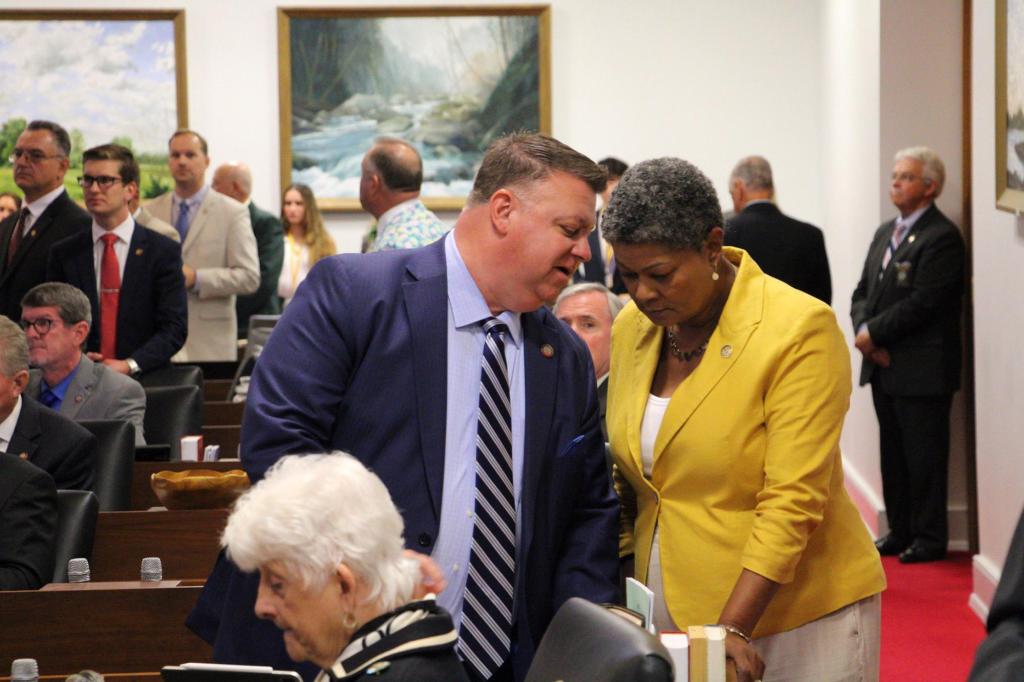
RALEIGH, N.C. (AP) — The North Carolina General Assembly finalized legislation Wednesday to authorize statewide and regulate sports and horse-race wagering, a decision poised to open the nation’s ninth-largest state to more legal gambling options.
The House voted 68-45 for changes completed last week by the Senate to the bill. It now goes to Gov. Roy Cooper, who again this week expressed support for legalized sports gambling. The Democrat is expected to sign the measure, which would offer online betting on professional, college and Olympic-style sports and some in-person betting to adults 21 and over starting in the next six to 12 months.
House members tentatively voted for the Senate version of the bill on Tuesday after no debate. Anti-gambling forces made one last stand Wednesday seeking to block the proposal, which they were successful in doing to a similar bill nearly a year ago in the chamber.
But lawmakers who opposed the bill in 2022 were no longer in the House as the new legislative session began in January, and sports wagering companies and professional sports teams likely to profit from this gambling expansion kept up their lobbying.
Nearly half of the House’s members sponsored the measure that initially cleared the chamber in March. The final bill passed both chambers of the Republican-controlled legislature with bipartisan support.
Legal sports gambling in North Carolina is only available right now at the state’s only three casinos, which are operated by two American Indian tribes. Essentially the only other legal gambling in the state is a lottery that began in 2006.
Otherwise, bill sponsors said North Carolina residents were already gambling on sports through illegal bookies or offshore work-arounds, and that authorizing, regulating and taxing the activity was the best way to control it.
“This is something that has been going on. The North Carolina taxpayers should get the benefit of this,” Cooper said this week on the “Ovies & Giglio” podcast show. “It’s pretty good legislation now.”
Opponents of the bill — a mix of social conservatives and some liberal-leaning Democrats — described the measure as a huge expansion of state-sanctioned gambling that would siphon money from people who can least afford to bet, leading to more gambling addictions and related societal ills.
Despite some improvements, “this predatory gambling bill is still predatory,” Rep. Pricey Harrison, a Guilford County Democrat, said during Wednesday’s floor debate. “It’s going to hurt North Carolina, and it doesn’t look like we’re going. to achieve very much in exchange.”
While betting could begin as early as January, the commission would have until June 2024 to open the betting.
About half of the states allow mobile or online sports betting, according to the American Gaming Association. They include North Carolina border states of Virginia and Tennessee.
Rep. Jason Saine, a Lincoln County Republican and a chief bill sponsor, said “what’s happening just across our borders” played a role in gaining the support from colleagues needed for passage this year.
“At some point they know that we’re losing money to other states, so I think that was a big driver in either changing minds or getting people that have not considered it before on board,” Saine said after the vote.
The North Carolina Lottery Commission would manage all of these new gambling options, issuing up to 12 interactive sports wagering licenses to entities that would be subject to extensive background checks and $1 million application fees.
The legislation also would allow sportsbooks to open at or near several pro sports venues, including those where NASCAR races and big golf tournaments are held. There people could make cash bets without creating online accounts through the betting companies that operate them.
The final version also authorizes separate licenses for horse-race gambling operators to offer thoroughbred racing and would authorize the commission to set rules for live horse racing in the state.
The legislation would tax sports wagering at a rate equal to 18% of gross betting revenue minus winnings. The earlier proposal in the House set a similar 14% tax with more deductions.
After expenses, legislative analysts estimate the state would take in $71 million annually by mid-2028 from both sports wagering and horse racing. Much of the sports wagering tax revenues would go to local, regional and state athletics initiatives, athletic programs at most University of North Carolina system schools and problem-gambling programs.